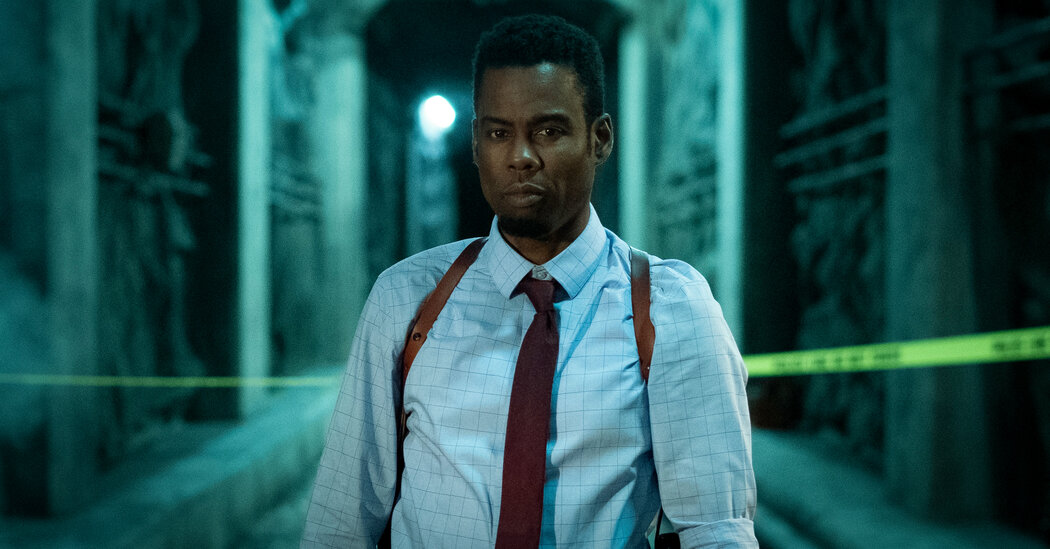
After the success of Jordan Peele’s Oscar winning Get Out in 2017, it was only a matter of time until studio executives around Hollywood sought to replicate its breakout success by giving other comedians a shot at venturing into the horror movie with a social commentary thread space. A chance conversation that all-time great comedian Chris Rock had with one such executive about the genre-shifting horror franchise Saw has led to the latest entry in the series Spiral: From the Book of Saw. Rock’s forays into movies have previously been hit or miss, so the pressure to succeed in taking up the mantle of this franchise is pretty hefty.
Working in the shadow of his father former police Captain Marcus Banks (Samuel L. Jackson), Detective Ezekiel “Zeke” Banks (Chris Rock) and his rookie partner take charge of an investigation into grisly murders that are eerily reminiscent of the city’s gruesome past experiences with the serial killer Jigsaw. Unwittingly entrapped in a deepening mystery, Zeke finds himself at the center of the killer’s morbid game.
The major draw to this film is the question of its place in the Saw hierarchy and whether or not it is a worthy entrant in the popular franchise. Spiral more than lives up to the Saw legacy in the gore and intricate torture games deployed by the film’s killer antagonist. The gore is what we’ve come to expect from these movies, bloody and extensive without crossing the line into gratuitousness. The film’s torture contraptions also manage to be inventive and written well with their tie-ins to the moral lesson being inflicted upon the victim. Chris Rock’s humorous touch is also present here and works perfectly within the context of his character’s personality, avoiding being a distraction or feeling out of place within a horror film. There are numerous, genuine laugh out loud moments that give the film a good balance and add to its watchability. While Spiral may be the latest installment in the beloved horror series, it shares substantial DNA with David Fincher’s classic cop thriller Se7en, not just through its narrative following the cat and mouse game between law enforcement and an unidentified serial killer with a message behind his brutality, but also in its cinematography which ultimately turns out to be the best in the franchise. The film’s killer with a cause is the source for its interesting and topical theme surrounding police misconduct and how best to address reforming the system under which law enforcement operates.
Zeke and the film’s murderous antagonist both find themselves disgusted by and at odds with the fatal corruption present in within the Metro department, with Zeke having had turned in his corrupt partner as a young beat cop as we learn early on. Zeke tried reforming the ills of the department within the system, only to end up ostracized and left to be shot by a suspect as his fellow officers refused to respond to his calls for backup. In the shadow of Zeke’s failure to spark change through doing the right thing, the killer takes it upon himself to rid the department of its bad apples by physically removing them himself. He has found that systems cannot be reformed through protocols, only through drastic action. Such debate is ongoing in the world around us, as the United States tries to grapple with its centuries long conflict between law and order and civil rights for minorities. This philosophical debate played out onscreen between a serial killer and cop who both enforces the law but also recognizes the need to rid his profession of its own criminals makes for an interesting angle on top of its typical cop chases cunning killer story. Despite this interesting theme, Spiral doesn’t delve too deeply into the subject, making it more of a complement to the story than a vocal point. This isn’t to say that the film suffers for it, but it doesn’t elevate it past the interesting thriller that it is into a deeper examination of our society writ large.
Spiral also contains a bit of subtext surrounding the relationship and bond between fathers and sons. Without giving too much away, Zeke and the film’s antagonist serve as yin and yang to one another in this instance as well, with their actions and decisions tied into their paternal relationships. Zeke and Marcus have a thorny, gruff relationship colored by Marcus’ stellar reputation and career as police brass and Zeke’s struggle with working under that shadow, particularly following his decision to turn in a dirty cop. Much of what Zeke does in his capacity as an officer is about living up to his dad’s standard and proving himself not just as a cop, but to his father as well. Likewise, the antagonist’s father and his legacy plays a major role in his actions.
Spiral is a compelling thriller to watch with just enough key horror elements to keep its Saw-like feel and enough thematic depth to give it a voice. The movie also happens to be one of the best looking in the franchise, leaning heavily into the grit and grime of Se7en at moments. It is also full of easter eggs and references to the stars’ other films, such as Pulp Fiction and New Jack City, from the name of the safe manufacture in the basement of police headquarters (see if you can catch it) to Zeke’s name itself, a clear reference to the legendary Ezekiel 25:17 biblical passage uttered by Samuel L. Jackson’s Jules in Pulp Fiction about a righteous man beset on all sides who finds himself beset amongst vengeance. The humor offered in the movie by Rock is well-balanced and fits the personality of the character without coming across as a comedian trying to fit into a horror-thriller. Spiral is an intriguing first step into a potential anthology franchise within a franchise, something that is entertaining on its own with room to built upon further.
Image: Lionsgate

